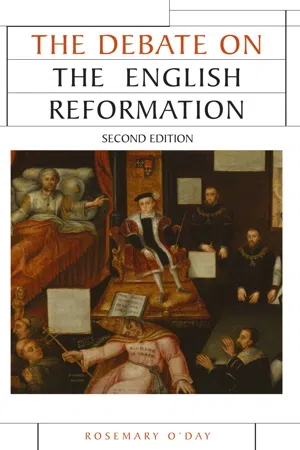History
Henry VIII
Henry VIII was the King of England from 1509 to 1547. He is best known for his six marriages and his role in the separation of the Church of England from the Roman Catholic Church, leading to the English Reformation. His reign also saw significant changes in English politics, society, and religion, making him one of the most influential monarchs in English history.
Written by Perlego with AI-assistance
Related key terms
2 Key excerpts on "Henry VIII"
- eBook - ePub
The Age of Reformation
The Tudor and Stewart Realms 1485-1603
- Alec Ryrie(Author)
- 2017(Publication Date)
- Routledge(Publisher)
So does all this amount to an English Reformation? Perhaps it was the beginnings of one. The grubby tale of marital breakdown is an eternal one, but only in the early sixteenth century could it have blown up into a jurisdictional dispute and into national schism. The European Reformation did not cause the English political crisis of 1527–34, but it made the eventual solution to that crisis possible. Christian humanism had given Henry VIII a taste for Biblical arguments, and that, combined with his self-righteous theatricality, made him less likely to seek a modest, legalistic solution to the crisis. Lutheran arguments about the spiritual authority of kings, filtered through Tyndale and through Anne Boleyn, gave Henry the moral confidence he needed first to bully the Church, then to threaten schism and finally to make good on that threat. The spread of evangelical doctrines in the universities, at court and in a few other small but influential circles gave Henry much-needed allies, as the squabble over his marriage turned into a broader battle with the papacy. And the successful schisms of the German and Scandinavian princes proved that it could be done without courting annihilation either from the emperor or from God. Henry’s schism was not, yet, a Protestant Reformation. But it was a Reformation made possible by Protestantism.The Henrician ReformationFor the last thirteen years of his life, Henry VIII ruled as Supreme Head of the Church of England and extended those claimed powers to Wales and Ireland as well (Chapter 11 ). But what he did with that authority remains frustratingly difficult to pin down. Henry’s religious policy baffled his contemporaries and has proved equally puzzling to historians. On one traditional reading, his ‘Reformation’ consisted of Catholicism without the pope – but this suggests that the old Church could have been beheaded and still have carried on regardless. Or alternatively, this was a sham Reformation driven by the king’s lust and greed, in which religion was a mere smokescreen. Another view still would see it as a moderate Reformation, a virtuous middle way between the extremes of Catholicism and Protestantism (much of Henry’s own rhetoric can be quoted in support of that view). Perhaps it had no religious coherence to it at all, and was a mere ‘ragbag of emotional preferences’.11 - eBook - ePub
The Debate on the English Reformation
Second edition
- Rosemary O'Day(Author)
- 2015(Publication Date)
- Manchester University Press(Publisher)
The Tudor Constitution: Documents and Commentary (1960), The Tudor Revolution in Government (1953) and England under The Tudors (1955). Yet nowhere was his challenging view of Henry’s part in the Reformation more clearly and persuasively expressed than in a brief pamphlet produced for the Historical Association in 1962, Henry VIII: An Essay in Revision.32King or minister?In this pamphlet, Elton questioned the assumption made by Pollard that Henry’s reign can conveniently be divided into two: a period from 1514 to 1529, when Henry let Wolsey govern and was Wolsey’s apprentice; and a period from 1529 to 1547, when Henry assumed the reins of government and was thus the ‘very embodiment of personal monarchy’. Elton suggested that there was no unity in the years 1529 to 1547 such as Pollard assumed. The 1530s were marked by a successful internal policy, the 1540s by unsuccessful foreign policies against France and Scotland, internal problems and economic crisis. Moreover, Henry had never left government entirely to Wolsey: he had, for example, managed state trials throughout the reign and he had been active personally in foreign policy early in the reign (the war of 1512–14). Elton was above all suspicious of the view that Henry was ever totally in control of his government and its policies. Certainly only he could make or unmake ministers; both Wolsey and Cromwell learnt that to their cost. But Henry was often manipulated by his own councillors. And, while it is true that he was diligent in matters of business during Cromwell’s ascendancy – reading and signing letters and papers – he did not initiate policy but relied upon Thomas Cromwell to devise and control it. He was sufficiently intelligent to recognize in Cromwell gifts of industry and creative statesmanship and to delegate power to him. Naturally it was a power delegated on condition that Cromwell devised and executed policies broadly to the King’s liking. Elton argued that Henry kept a more watchful eye upon Cromwell’s activities with respect to theological and ecclesiastical affairs – he took a great interest in the Act against appeals to Rome in 1533, for instance. He rejected, however, the idea that, in all matters of moment, the King instructed Cromwell verbally to follow particular courses of action. As most of the business of government was normally carried on away from the court, oral communication between King and minister was impossible, and no letters survive to support this view of affairs.
Learn about this page
Index pages curate the most relevant extracts from our library of academic textbooks. They’ve been created using an in-house natural language model (NLM), each adding context and meaning to key research topics.

